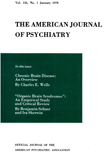PSYCHOSIS, DRIVE AND INHIBITION : A THEORETICAL AND EXPERIMENTAL ACCOUNT
Abstract
An attempt has been made in this paper to account in theoretical terms for the generalised slowness which has been shown in previous work to characterise psychotic patients. Making use of the theoretical framework of modern learning theory, two hypotheses were put forward, relating psychotic slowness respectively to: 1. Lack of drive ( motivation) ; 2. An exceedingly slow rate of dissipation of reactive inhibition. It was deduced from the theorems of learning theory that psychotics should be characterised by very low reminiscence scores on tasks involving massed practice if either of the two hypotheses were correct, and experimental evidence does indeed show that psychotics are differentiated from normals and neurotics in precisely this way. It was then argued that a crucial test between the two hypotheses could be performed by varying the length of the rest period used for establishing reminiscence scores, and it was found that while with short rest periods psychotics showed no reminiscence, they did show very strong reminiscence effects after long rest periods. This is interpreted as irreconcilable with the hypothesis of low drive in psychotics, and may be used as support for the hypothesis that psychotics are characterised by a slow rate of dissipation of inhibition.
Access content
To read the fulltext, please use one of the options below to sign in or purchase access.- Personal login
- Institutional Login
- Sign in via OpenAthens
- Register for access
-
Please login/register if you wish to pair your device and check access availability.
Not a subscriber?
PsychiatryOnline subscription options offer access to the DSM-5 library, books, journals, CME, and patient resources. This all-in-one virtual library provides psychiatrists and mental health professionals with key resources for diagnosis, treatment, research, and professional development.
Need more help? PsychiatryOnline Customer Service may be reached by emailing [email protected] or by calling 800-368-5777 (in the U.S.) or 703-907-7322 (outside the U.S.).



